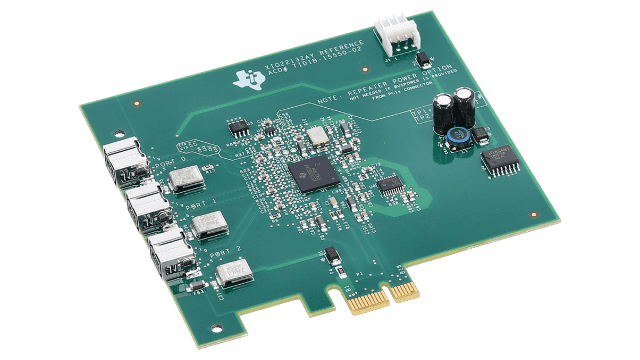Features for the XIO2213BEVM
- Full x1 PCI Express Throughout
- Fully Compliant with PCI Express Base and 800M Bits/s Specification, Revision 1.1
- Utilizes 100-MHz Differential PCI Express Common Reference Clock or 125-MHz Single-Ended Reference Clock
- Fully supports provisions of IEEE P1394b-2002 Global Unique ID for the 1394 FabricFully Compliant With Provisions of IEEE Std 1394-1995 for a High-Performance Serial Bus and IEEE Std 1394a-2000
- Fully Compliant with 1394 Open Host Controller Interface Specification, Revision 1.1 and Revision 1.2 draft
- Three IEEE Std 1394b Fully Compliant Cable Ports at 100M Bits/s, 200M Bits/s, 400M Bits/s, and 800M Bits/s
- Cable Ports Monitor Line Conditions for Active Connection To Remote Node
- Cable Power Presence Monitoring
- EEPROM Configuration Support to Load the Global Unique ID for the 1394 FabricSupport for D1, D2, D3hot
- Active State Link Power Management Saves Power When Packet Activity on the PCI Express™ Link is Idle, Using Both L0s and L1 States
- Eight 3.3-V, Multifunction, General-Purpose I/O Terminals
Description for the XIO2213BEVM
The XIO2213B EVM is a functional implementation of a PCIe to PCI translation bridge, where the PCI bus interface is internally connectedto a 1394b open host controller/link-layer controller with a 3-port 1394b PHY. The PCIe to PCI translation bridge is fully compatible with the PCI Express to PCI/PCI-X Bridge Specification, Revision 1.0. Also, thebridge supports the standard PCI-to-PCI bridge programming model. The 1394b OHCI controller function is fully compatible with IEEE Std 1394b and the latest 1394 Open Host Controller Interface (OHCI) Specification. Designed as a x1 add-in card, it is routed on FR4 with a standard 4-layer board with 100 Ohm differential impedance (For PCI-Express differential pairs), 110 Ohm differential impedance (For 1394b pairs), and 50 Ohm single-ended impedance using routing guidelines and requirements specified in the PCI Express Card Electromechanical Specification rev 1.0a, PCI Local Bus Specification rev 2.3 and IEEE 1394b-2002.
